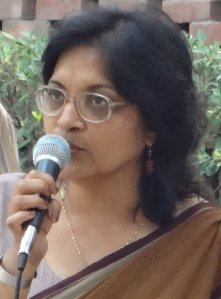VC gets support from AAD, INTEC and NDTF for Match-Fixing
The Committee constituted by the VC to draft Ordinances on recruitment, promotions and other service conditions (after final notification of the UGC Regulations) included members from AAD, INTEC and NDTF, while members of DTF and other groups who vocally opposed the FYUP were kept out. Its mainly anti-teacher recommendations (download here) were passed with few dissents (download: Dissents AC 16Aug2013 ¦ Dissents EC 17Aug2013 ¦ Amendments EC 17Aug2013). While some of these recommendations were brought before the AC, most were taken directly to the EC though they concern academic matters that were always first brought to the AC in the past. Clearly, the entire exercise was designed to dash the teaching community’s hopes for justice.
RECRUITMENT: THREE NEGATIVES
Screening/shortlisting for interviews
Overstepping the UGC Regulations, the Ordinances now insist that candidates will be screened on the basis of API scores as follows:
Assistant Professor (Colleges)
- Academic Qualifications: UG-60%+ (12), 50-60% (9); PG-60%+ (16), 55-60% (12), MPhil (10), PhD (17), NET (7), NET-JRF (10); Maximum Points: 65
- Research publications: Maximum Points: 15
- Post PhD Research/Teaching Experience: 1 point for every 4 months or 4 per year. Maximum Points: 20
Assistant Professor (University)
- Academic Qualifications: UG-60%+ (10), 50-60% (7); PG-60%+ (15), 55-60% (11), MPhil (5), PhD (17), NET-JRF (3); Maximum Points: 50
- Research publications: Maximum Points: 30
- Post PhD Research/Teaching Experience: 1 point for every 4 months or 4 per year. Maximum Points: 20
Additionally, candidates are to be shortlisted for posts in Colleges/Departments as follows: the first 50/30 candidates for one post, 20/10 for every further post. The demand by DTF member Abha Dev Habib, that there should be no screening based on API scores and no shortlisting or, at least, that the number be large enough to include all existing ad hoc teachers, was turned down.
Selection Committees approved for recruitment in Colleges and Departments are at variance with the UGC Regulations. This, despite the fact that the Visitor had earlier struck down similar modifications made by DU in 2003 and had forced it to suspend appointments till its Selection Committees had been brought in consonance with UGC Regulations. This time the objective is clearly to concentrate powers in the hands of the VC and enable manipulation.
Principals: While 22 colleges await appointment of Principals, the UGC Regulations on Selection Committees and 5-year Term Post for Principals were not put on the agenda. Yet, on the eve of the AC Meeting (15 August 2013), the post of Principal for ARSD College was advertised as per the unamended Ordinance. The game is clearly to appoint select persons loyal to the administration as principals till retirement.
PROMOTION SCHEME
CAS 2010 is to be implemented w.e.f. 17 August 2013. This was a major DUTA demand after the Gazette Notification of 13.6.2013. The long overdue Dynamic Assured Career Progression (DACP) has been accepted for teachers of Faculty of Medical Sciences.
While past service will be counted for upward movement from 6000 AGP to 7000 AGP, this long-standing benefit has been denied to Librarians and severely eroded for subsequent movements for all teachers by the following stipulations: at least 5 years in the 7000 AGP and 3 years 8000 AGP. Neither will total research experience of previous stages count in the upward movement from one grade pay to another, though this was part of the UGC Regulations.
Further, while the UGC Regulations require the promotion process to be completed within 6 months of application, this clause was not included in the Ordinance, thus ensuring continuation of selective, arbitrary and inordinately delayed promotions.
While Students’ Feedback has been included as a component of the Points System, the safeguard provided in the UGC Regulations, that this would not be used against teachers, had been dropped in the draft Ordinance. When the VC refused to drop this provision, Abha Dev Habib insisted on inclusion of the UGC’s safeguard provision: this was eventually accepted.
WORKING HOURS
Ordinance XIII as it stood stipulated a maximum of 18 periods as workload. The amendment lays down 14 hours of direct teaching for Associate Professors and 16 for Assistant Professors. Our demand to rephrase the amendment to read “maximum of 14 hours” and “maximum of 16 hours” was rejected. Further, the Ordinance now stipulates that “It shall be necessary for the teacher to be available for at least 5 hours daily in the University/College”. The same provision in the UGC Regulations is conditional: it requires that “necessary space and infrastructure should be provided by the University/ College”. Abha Dev Habib was the lone voice in the EC demanding that this stipulation be dropped unless appropriate space and infrastructure for academic pursuit is first made available or that the omitted clause about space and infrastructure be included.
EXTENSION BEYOND 65 FOR UNIVERSITY OFFICIALS
If the VC, PVC, Dean of Colleges, Director, South Campus and Director, SOL attain the age of 65 during their term of office, they will now superannuate from their teaching post but continue for the remainder of their term in office. This impromptu proposal was placed directly in the meeting and was pushed through to benefit the Dean of Colleges who is about to superannuate.
LEAVE RULES
With adoption of the new UGC leave rules, Sabbatical Leave has been extended to Associate Professors in both Departments and Colleges and full salary benefits irres-pective of any fellowship amount during Study Leave. However, the leave rules still suffer from some major problems such as the following:
– In study leave for PhD, “completion of study” should not be interpreted as submission of thesis.
– The new rules, effective from 17.8.2013, should also be applicable to teachers currently on study leave.
On the insistence of Abha Dev Habib, it was agreed to set up a committee to address such problems.
FOUNDATION COURSES: CHANGES IN EVALUATION SCHEME
Barely a month into starting of the FYUP, the examination scheme has been amended to allot 55 marks for Internal Assessment and only 20 for the semester-end exam. The elected members belonging to the AAD, INTEC, NDTF, supported this anti-academic move. This confirms the utterly non-serious thrust of the FYUP. This is also a step toward dismemberment of the University and making colleges autonomous.
NAAC
Delhi University has been now brought under NAAC, under which institutions (universities, colleges, departments) are assessed and graded to establish eligibility for funding. The system has been tailored to push institutions toward resource generation and self-financing including a switch to marketable courses. This is why the DUTA and the AC time and again had rejected accreditation to NAAC. As reported widely in the media the reputation of NAAC inspection is that rating of institutions is based on considerations other than academic.
VOTE DTF!
The DU administration is misusing official platforms to influence the outcome of the DUTA elections. This is a sign of its desperation to control the DUTA. In an open letter to teachers the PVC and Director, South Campus, repeat many promises the VC was to have already fulfilled by now. Meetings are being held in the South Campus, apparently to discuss Foundation Courses with ad hoc teachers, where the DTF is criticised and the AAD-INTEC candidate introduced. The DU administration believes that it can control how ad hoc teachers vote despite the secret ballot. Nothing else explains the tom-tomming that API scores will not be counted in the interview for recruitment while they remain silent that many ad hoc teachers will be denied an interview call due to API scores for screening.
The legitimate anger caused by the adverse EC decisions is our hope for the urgent struggles ahead to get these decisions changed. We appeal to all teachers to vote massively and fearlessly against the DU administration and groups supporting it.
Take the struggle forward!
Elect
B. No.
2
Nandita Narain
Dept of Mathematics, St. Stephen’s College
Tel: 9810261909
Email: nanditanarain@gmail.com
as DUTA President
and
B. No.3Bhupinder ChaudhryDept. of History, |
B. No.6Deo KumarDept. of Hindi, |
B. No.15Saikat GhoshDept. of English, |
B. No.21Vijaya VenkataramanDept. of Germanic & Romance Studies, |




